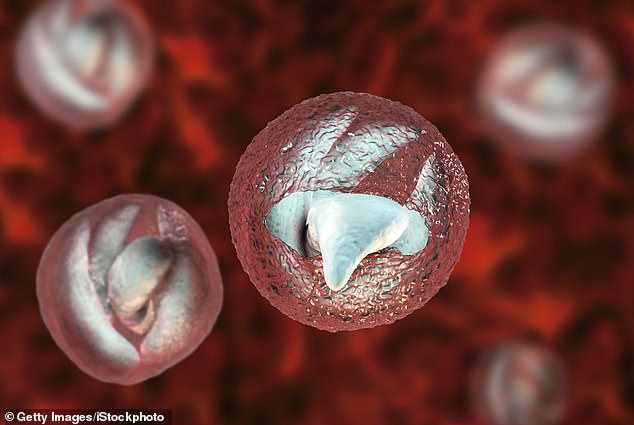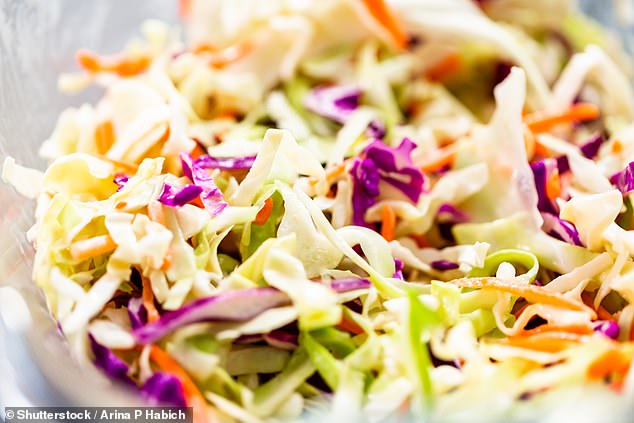Almost a fifth of pre-washed vegetables found in UK supermarkets could contain a parasite found in contaminated faeces, a study suggests.
Scientists found traces of cryptosporidium, the same parasite responsible for an outbreak that affected more than 100 people in Devon last month and caused severe gastric symptoms, in 17 per cent of supposedly ready-to-eat vegetables.
The experts behind the study did not reveal which supermarkets had contaminated vegetables, as they wanted to raise awareness about the supply chain that leads to this contamination, rather than specific outlets.
But they told MailOnline that the level of risk would likely be the same across the sector and that all “pre-washed” or ready-to-eat vegetables should be treated with suspicion.
Cryptosporidium is usually contracted by drinking water contaminated with infected human or animal faeces, such as the outbreak in Devon earlier this year. However, you can also get it through food.
Experts from the University of Kent found cryptosporidium in 17 percent of supposedly ready-to-eat vegetables bought in supermarkets.

Cryptosporidium parasites are protected by a thick layer that allows them to survive even in chlorinated pool water.
This usually occurs when vegetables were grown in infected manure and were not washed enough or if a person infected with the parasite was involved in food preparation.
In their study, experts from the University of Kent analyzed 24 samples of pre-washed vegetables collected from four Canterbury supermarkets in 2023.
Four of them (17 percent) tested positive for traces of cryptosporidium.
Although these vegetables have been washed with water containing disinfectants, cryptosporidium is resistant to these and therefore can survive this process.
This is significant, since eating just a small amount of cryptosporidium, just 10 oocysts, the form the parasite takes to survive outside a host, is enough to make a person sick.
The experts behind the study could only detect “traces” of the parasite and could not confirm whether enough oocysts were present to cause disease.
However, Dr Anastasios Tsaousis, lead author of the study and parasite expert, told MailOnline that there is likely to be some risk with all types of pre-washed vegetables.
“Any product that comes from the environment, for example exposure to soil and water, will have the same risk,” he said.
This is partly because those vegetables are processed in central facilities before being distributed throughout the country.
He added that he would recommend all Brits wash those vegetables themselves again to reduce the risk of exposure.
Dr. Tsaousis also said the team’s discovery suggests improvements need to be made in the processing of these vegetables.
“The presence of cryptosporidium in pre-washed vegetables could mean reviewing the sanitary methods used by suppliers throughout the production chain, such as improved hygiene measures during harvesting, processing, packaging, transport and storage,” he said. .
“There is also a need to raise awareness among consumers about proper storage of vegetables and washing hands before eating them.”
Suggested methods include ensuring that all water used in vegetable supply chain preparations has been thoroughly boiled before use, or using other disinfection methods, such as the use of ozone, for added safety.
The authors, who published their work in the journal Parasitology researchsaid the presence of cryptosporidium in pre-washed vegetables was concerning as people increasingly relied on these products as a healthy food option.
“In recent years, ready-to-eat vegetables have become increasingly attractive to consumers because they provide healthy nutrition without the need for preparation,” they wrote.
They suggested that further research could examine how exactly vegetables become contaminated at higher levels of the supply chain.
Doctors technically call cryptosporidium infection cryptosporidiosis.
Patients often have to endure these symptoms for two weeks before they finally clear from their systems.
But some patients may experience longer bouts of illness in those with weakened immune systems, such as cancer patients.
Sufferers may also experience periods of false hope in which their symptoms disappear for a few days, making them believe they have finally overcome the infection, only for it to return.
Most people with cryptosporidiosis are not offered treatment and are instead told to drink plenty of fluids.
Patients with the infection are told not to go to work or school until they have been symptom-free for at least two days to avoid transmitting the virus to others.
The food safety of products bought in supermarkets has become a growing focus after hundreds of Britons were affected by a rare strain of E. Coli linked to contaminated salad leaves, prompting a mass recall of products.


